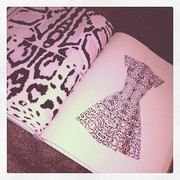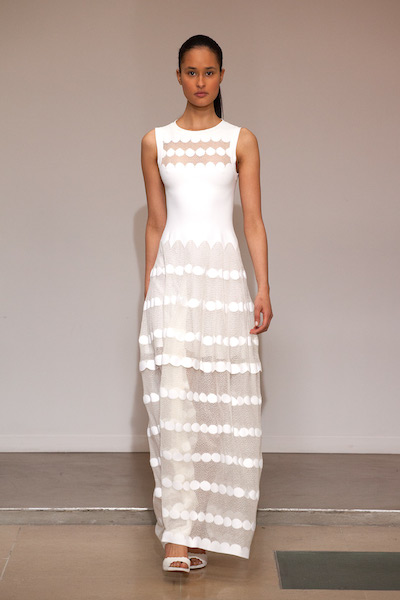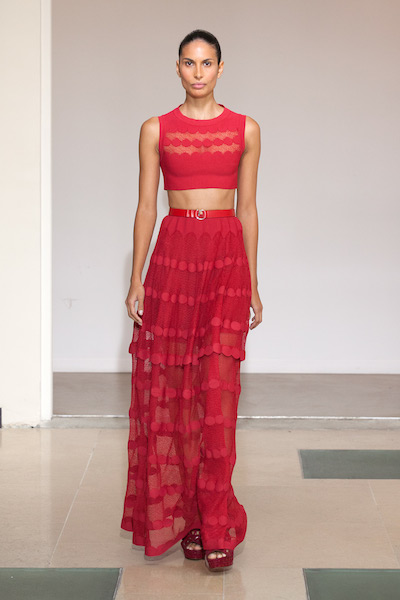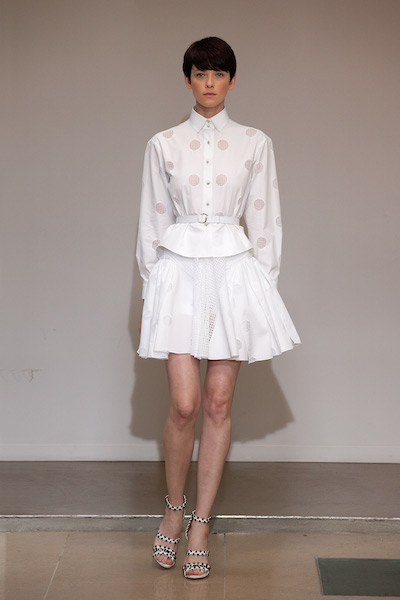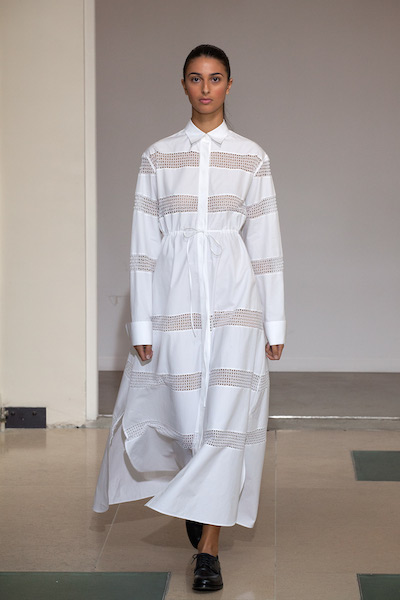The Future of Fashion, Part Nine: Azzedine Alaïa
October 31, 2011 9:35 am

In this ongoing series, Style.com’s editor in chief, Dirk Standen, talks to a number of leading industry figures about the challenges and opportunities that lie ahead for the fashion business.
There was an extra buzz in the front row at the Comme des Garçons show this season. A star was in our midst, and not just some movie actor or singer. Azzedine Alaïa, the great Tunisian-born, Paris-based designer, had come to support his friend, Rei Kawakubo. Fresh off the triumphant collection he showed during Couture in July, the first presentation he had opened up to the world’s cameras in eight years, Alaïa is more than great. He’s unique. He is the only major designer to produce collections on his own timetable, devoting his time to his private clients as well as to a thriving ready-to-wear business. (Richemont is an investor.) A few days after the Comme des Garçons show, I went to Alaïa’s headquarters in the Marais, a sprawling converted warehouse that houses his boutique, his cluttered studio (where the TV is usually tuned to the National Geographic Channel), and his living quarters. The thing that strikes you first is his vitality. He has the most infectious, mischievous giggle in fashion.
[Note: To see the full shoot of Saskia de Brauw, top, modeling Alaïa’s clothes, pick up a copy of Style.com/Print today. Photographed by Kacper Kasprzyk. Styled by Tony Irvine. Hair by Anthony Turner. Makeup by Janeen Witherspoon.]
—Dirk Standen
You are one of the only designers who have managed to work outside the system. What is your secret?
No, it’s not a secret. Today I believe that designers are asked to do too much, too many collections. It’s inconceivable to me that someone creative can have a new idea every two months. Because if I have one new idea in a year, I thank heaven. I pray, I do everything, but God doesn’t always give me ideas. [Laughs.] That’s why I’m always late with the collection.
Is it possible for young designers to follow your example?
I don’t know, to be honest. Because it’s not up to the designers anymore, it’s up to the places that employ them and demand this work from them. In my case, no one demands anything of me. When I decide to do something, I do it. But I make sure it works, too. The proof is that you sell.
Do you think it’s possible to change the system?
I don’t know, but something has to change. There are too many designers who are in a bad state, who are sick, who feel obliged to take drugs. Me, I’m high on life.
Did the stress contribute to the Galliano situation?
Yes, and [Christophe Decarnin at] Balmain. McQueen. There is too much pressure. If it ends up destroying people, it’s not good. A human being is not a machine. Especially when it comes to creating. You wouldn’t ask a painter or a sculptor to do an exhibition every two months… I even think it’s hard for the buyers and the journalists. They have to run from New York to London to Italy, Paris. And when it’s finished, they start again. They can’t spend any time with their families, their children. It’s not good.
It seems very important to you to be independent.
Even if I was in prison, I could be free in my head. I can adapt easily.
Is it true that you were offered the Dior job?
I don’t want to go into that story again. [Laughs..] No, they asked me a while ago, at the same time as Galliano, when he was at Givenchy. They asked me for Dior, but I couldn’t do it.
Do you think you would have been happy working for a big house?
Anything’s possible.
What do you think of fast fashion retailers?
I like them a lot.
It might surprise people to hear that.
It’s a very good system. Even if you don’t have money, you can still dress well. I shop at H&M and Zara for my cousins and my nieces.
You don’t think they copy other designers?
Listen, everyone copies.
You’re known for your devotion to technique. You’ve worked with the same knitwear factory in Italy for 30 years, for example. But do you think technique is dying out?
No, because there are people at the big houses who don’t know technique, but they are surrounded by great technicians. Dior wasn’t a technician. But he had a feel for fashion, he had worked for a number of years at other houses, and he was surrounded by great technicians like Marguerite Carré … Chanel didn’t cut but she had a feel for it… Balenciaga, he cut. He knew. Cardin, he knew. There are people like that. Vionnet was at the highest level. But at the same time there are other houses where the designer is surrounded by people who even today have a lot of technique and understand it.
You’re not concerned that young designers will lose the sense of technique?
No, because there are good schools, schools where they learn. These schools exist.
So you are optimistic about the future of fashion?
Fashion will last forever. It will exist always. It will exist in its own way in each era. I live in the moment. It’s interesting to know the old methods. But you have to live in the present moment. The evolution today is in the machinery. There are machines that did not exist before. It allows you to be a lot more of a perfectionist.
Does the Internet interest you?
It interests me, of course. When I’m looking for a singer or music, I do the search myself. [Laughs.] No, I don’t know how to use it. But all my assistants know how to do it. I ask them to look it up for me.
But you don’t have a BlackBerry?
I have one, but I leave it on the table and I forget about it for a week.
What is the role of the fashion press?
The press is important, very important.
Has that role changed with the Internet?
It’s changed a lot. At any second, the whole world knows everything. That’s why it’s important that fashion magazines work more seriously, that they take the time to do good subjects with good photographers that you don’t find on the Internet. With the Internet, fashion goes directly to the world the same day, the same hour. Whether you are a journalist in the room or someone at home, you see it at the same time.
Is that a good thing?
It’s good, but not for the newspapers. Soon people won’t read newspapers anymore. They go on the Internet for their news. I saw a television program the other day; at schools they don’t write [by hand] anymore. Pupils go to school with their computers. Learning to write will disappear. And when they asked the little kids about it, they said, Yes, I look on the Internet if I want a book. The brain worked better before because you were forced to use your brain more. But that doesn’t mean the intelligence is less. People are more advanced now. When I meet kids today, I think, my God, I don’t know anything. But every era is different. You shouldn’t think it’s good or not good. You must live in the era you’re in. Each era will be different and it’s important to follow it. You don’t want to grow old with the past.
You and Karl Lagerfeld have managed to avoid that trap.
You’re talking about two different worlds. He goes in one direction, I go in another.
But you respect Lagerfeld?
I respect all designers. No doubt he is a worker.
People would say that you are two of the greatest designers.
I don’t think I’m a great designer. I’m good, but great is another matter… I have a lot to learn.
style.com










